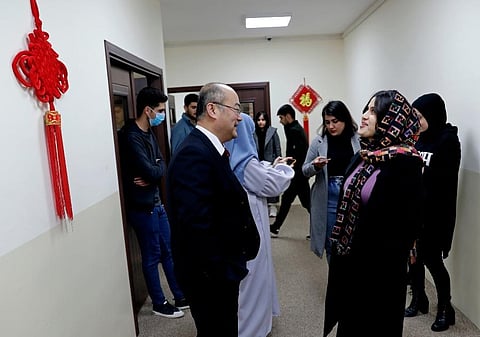

BAGHDAD: As Beijing hopes to expand its interest in the Middle-East region, it has been trying to achieve its ends through the means of its contentious Soft Power.
China's interests in Iraq, anchored in energy to quench its growing needs, are expanding. Beijing is building power plants, factories, water treatment facilities, as well as badly needed schools across the country, according to Los Angeles Times.
Dozens of contracts signed in recent years ensure China's growing footprint, even as major Western companies, including the US, plot their exit.
While Iraqi officials say they desire a greater US presence, they find appeal in China's offer of development without conditions for democracy or reform and its deft diplomacy.
"The language school is a projection of Chinese soft power, to familiarise the region with China. The more familiar they are, the more attracted they will be to Chinese goods," said Sardar Aziz, a researcher who recently wrote a Kurdish-language book about China-Iraq relations.
On the other hand, Chinese companies dominate Iraq's key economic sector, oil, and Beijing consumes 40 per cent of the country's crude exports. But from a narrow focus on hydrocarbons, Chinese investments have grown to include other industries, finance, transport, construction, and communications, as noted by Los Angeles Times.
The shift was spurred following Chinese President Xi Jinping's 2013 announcement of the ambitious Belt and Road Initiative, dubbed the new Silk Road, composed of a vast array of development and investment initiatives from East Asia through the Middle East to Europe. The US considers it unsettling, akin to a Trojan horse for Chinese expansion.
The initiative calls for China to develop relations with states along its path through political coordination, infrastructure connectivity, trade and financial integration, and people-to-people bonds.
In 2017, the Chinese consulate approached Salahaddin University's College of Languages with the idea of a Chinese language department. Opening a school in the capital Baghdad came with security risks, but the northern Kurdish-run region was relatively secure.
Chinese companies dominate oil contracts in Iraq, from operating fields to providing downstream services, and they continue to win more. Recently, Iraq finalized terms with China's Sinopec to develop Mansuriya gas field, which could produce 300 million standard cubic feet per day if approved by Iraq's next government, according to Los Angeles Times.